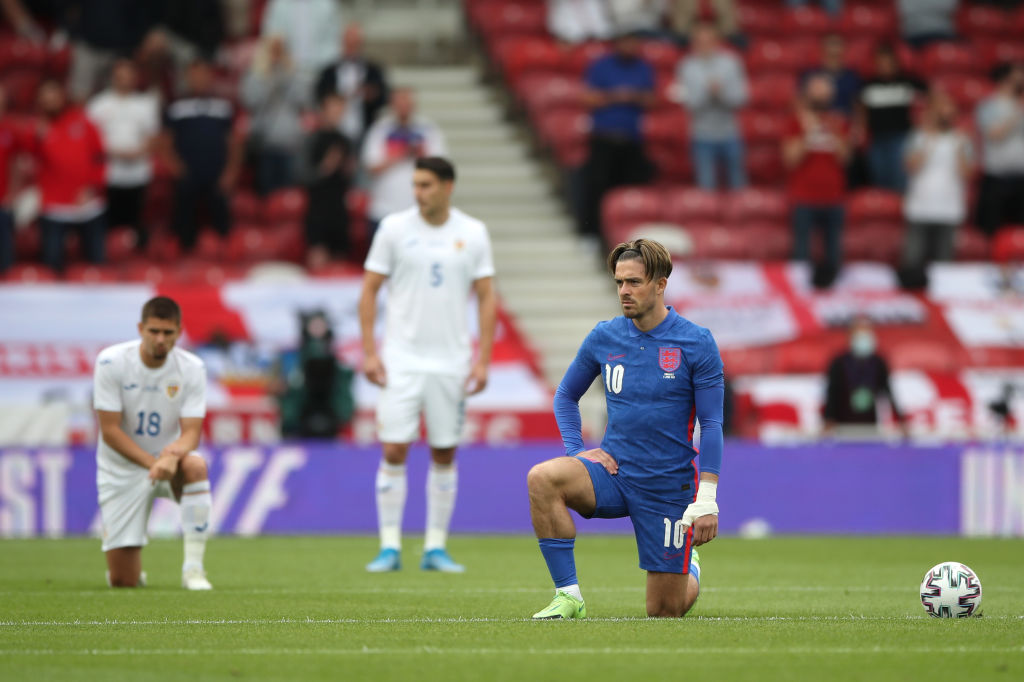England’s players being booed by their own fans is not a new phenomenon. But for the booing to be about politics rather than obnoxious personalities and tournament underperformance is. The furore over players taking the knee represents a new and exciting stage in the testy relationship between team and fans, in which each can take actions calculated to annoy and upset the other side, while believing themselves to be entirely in the right.
The England team – in the words of manager Gareth Southgate – believe they’re just ‘trying to move towards equality and support our own teammates.’ For the FA, taking the knee is nothing more than ‘a show of solidarity with the black community, including members of our squad who themselves continue to suffer abuse on a regular basis.’ This attitude rings through the media, which has described booing fans as ‘racists, boneheads, and people without compassion’, ‘morons,’ and ‘boorish cretins’, or bemoaned the return of crowds getting in the way of the political display.
So there it is then. Taking the knee is purely a gesture of solidarity, against racism. And anyone booing it is simply ignorant. Except. Hang on just a moment. Could there possibly be slightly more to it than that? After all, Millwall – not a team noted for its social justice warriors – booed players taking the knee at a match, then cheered when players linked arms and held up a banner against racism at the next game.
By making kneeling in the face of fan disapproval a point of principle, they’ve made giving in look like a sign of weakness
Why would racists, boneheads, and people without compassion boo one gesture, then cheer another with the same meaning?
The answer is that the two gestures don’t have the same meaning, at all. ‘Taking a knee’ is imported from America, tied to an American movement, arising from an American social context and tied to a set of demands alien to this country and its history. Britain may be a loyal imperial province desperate to show its ability to keep up with the social trends across the Atlantic, but it is still not America proper.
If a gesture or symbol is associated primarily with one cause, using it for a related one will mean people suspect that you are at best sympathetic to the original idea, and at worst trying to smuggle in support for it. Just because many organisations are now under the Black Lives Matter banner does not mean the movement simply stands for ‘being opposed to racism’.
These American associations undermine those who claim that taking the knee is a gesture of unity. The gesture certainly isn’t unifying for fans. When YouGov polled Premier League fans on taking the knee, approval and disapproval split 49 per cent to 41 per cent; hardly an overwhelming endorsement of the gesture. Fans were split along class and geographic lines, with lower socioeconomic and northern fans less likely to approve than Londoners and the well-off. Perhaps not the ticket to get the country behind the team as one.
It may be as well that the gesture’s American origins mean it is better at creating viral online moments than actually doing something about racism. Taking a knee is fundamentally better at raising awareness of the gesture itself, or its American origins, than pointing to concrete ways forwards for Britain. As Wilfried Zaha has noted, it sometimes feels as though ‘the meaning behind the whole thing is becoming something that we just do now. That’s not enough.’ QPR’s Les Ferdinand similarly views taking the knee as being like ‘a fancy hashtag or a nice pin badge’. In other words, slacktivism.
If the FA genuinely wants to unite players and supporters in opposition to racism, then why not meet the fans where they are? There are clearly ways to express support for the cause that would be welcomed.
There are some who would argue that division is the point; people need to be challenged to shake them out of their complacency. This seems tactically unwise, but it is also a fine example of the trend in British life towards ‘total politics’, the disappearance of places that are not subject to the creeping empire of the political. As strange as it might be for a political writer to say, we do need places where we aren’t continually focusing on political issues, because that space allows us to carve out common ground and coexist without constantly being reminded of our differences. The best way to love your neighbour who believes the country should be fundamentally different is to know them first as a fellow human being.
That, however, is off the table. The England team clearly intends to keep kneeling, and the fans to clearly express their disapproval. Which leads me to wonder: what, exactly, is the endgame here? Is the FA going to announce one day that racism has finally been defeated, triggering an end to kneeling and partying in the streets? Of course not. But I’m not entirely sure how they expect to climb down from this pole. By making kneeling in the face of fan disapproval a point of principle, they’ve put themselves in a position where giving in will look like a sign of weakness. This leaves us with an equilibrium where England will keep kneeling to not back down, the fans will keep booing, and America will eventually move onto the next neurosis, leaving Britain imitating the imperial fashions of years past, as befits our status as a backwater.







Comments